Sunderland City Council elections
Sunderland City Council elections are generally held three years out of every four, with a third of the council being elected each time. Sunderland City Council is the local authority for the metropolitan borough of the City of Sunderland in Tyne and Wear, England. Since the last boundary changes in 2004, 75 councillors have been elected from 25 wards.[1]
Political control
From 1889 to 1974 Sunderland was a county borough, independent of any county council.[2] Under the Local Government Act 1972 it had its territory enlarged and became a metropolitan borough, with Tyne and Wear County Council providing county-level services. The first election to the reconstituted borough council was held in 1973, initially operating as a shadow authority before coming into its revised powers on 1 April 1974. Tyne and Wear County Council was abolished in 1986 and Sunderland became a unitary authority. Sunderland was awarded city status in 1992. Political control of the council since 1973 has been held by the following parties:[3][4]
| Party in control | Years | |
|---|---|---|
| Labour | 1973–present | |
Council composition
Whilst under Labour control solidly since 1973, the political composition of Sunderland City Council has fluctuated over the years as the Conservatives, SDP-Liberal Alliance, and Independents gained seats from the Labour Party. Until 2019, only Labour, Conservatives, Liberal Democrats and Independents (including Independent Labour) had ever won seats on Sunderland City Council. When UKIP and Green Party councillors were elected in 2019, Sunderland became one of the few British councils with all five parties represented. The table below gives an impression of the council's composition based on local election results.[7]
| Election | Conservative | Labour | Liberal Democrat[8] | Independent | UKIP | Green | Total |
|---|---|---|---|---|---|---|---|
| 1973 | 21 | 56 | 0 | 1 | 78 | ||
| 1975 | 23 | 52 | 1 | 2 | 78 | ||
| 1976 | 26 | 49 | 1 | 2 | 0 | 78 | |
| 1978 | 27 | 49 | 1 | 1 | 0 | 78 | |
| 1979 | 24 | 53 | 0 | 1 | 0 | 78 | |
| 1980 | 18 | 58 | 1 | 1 | 0 | 78 | |
| 1982 | 15 | 49 | 8 | 3 | 0 | 75 | |
| 1983 | 14 | 52 | 7 | 2 | 0 | 75 | |
| 1984 | 13 | 53 | 7 | 2 | 0 | 75 | |
| 1986 | 11 | 59 | 5 | 0 | 0 | 75 | |
| 1987 | 10 | 61 | 4 | 0 | 0 | 75 | |
| 1988 | 9 | 63 | 3 | 0 | 0 | 75 | |
| 1990 | 8 | 64 | 3 | 0 | 0 | 75 | |
| 1991 | 8 | 64 | 3 | 0 | 0 | 75 | |
| 1992 | 8 | 64 | 3 | 0 | 0 | 75 | |
| 1994 | 8 | 64 | 3 | 0 | 0 | 0 | 75 |
| 1995 | 5 | 67 | 3 | 0 | 0 | 0 | 75 |
| 1996 | 4 | 68 | 3 | 0 | 0 | 0 | 75 |
| 1998 | 4 | 68 | 3 | 0 | 0 | 0 | 75 |
| 1999 | 8 | 64 | 3 | 0 | 0 | 0 | 75 |
| 2000 | 10 | 62 | 3 | 0 | 0 | 0 | 75 |
| 2002 | 11 | 62 | 2 | 0 | 0 | 0 | 75 |
| 2003 | 9 | 63 | 1 | 2 | 0 | 0 | 75 |
| 2004 | 12 | 61 | 2 | 0 | 0 | 0 | 75 |
| 2006 | 13 | 59 | 2 | 1 | 0 | 0 | 75 |
| 2007 | 17 | 53 | 1 | 4 | 0 | 0 | 75 |
| 2008 | 22 | 48 | 1 | 4 | 0 | 0 | 75 |
| 2010 | 18 | 52 | 1 | 4 | 0 | 0 | 75 |
| 2011 | 14 | 56 | 1 | 4 | 0 | 0 | 75 |
| 2012 | 8 | 64 | 0 | 3 | 0 | 0 | 75 |
| 2014 | 8 | 63 | 0 | 4 | 0 | 0 | 75 |
| 2015 | 6 | 66 | 0 | 3 | 0 | 0 | 75 |
| 2016 | 6 | 67 | 1 | 1 | 0 | 0 | 75 |
| 2018 | 8 | 61 | 6 | 0 | 0 | 0 | 75 |
| 2019 | 12 | 51 | 8 | 0 | 3 | 1 | 75 |
| 2021 | 18 | 42 | 12 | 0 | 3 | 0 | 75 |
| 2022 | 18 | 41 | 14 | 1 | 0 | 0 | 75 |
Council elections
Sunderland's Council area comprises 25 wards, each electing three councillors. Elections are held in thirds, in three years out of every four. Between 1974 and 1986, elections were held in every fourth year to Tyne and Wear County Council, until the County Council was abolished. In 1982 and 2004, all seats on Sunderland Council were up for election following boundary changes.[9]
Elections under 1973-1980 boundaries
- Sunderland Metropolitan Borough Council election, 1973 (whole council elected)
- Sunderland Metropolitan Borough Council election, 1975
- Sunderland Metropolitan Borough Council election, 1976
- Sunderland Metropolitan Borough Council election, 1978
- Sunderland Metropolitan Borough Council election, 1979
- Sunderland Metropolitan Borough Council election, 1980
Elections under 1982-2003 boundaries
- Sunderland Metropolitan Borough Council election, 1982 (whole council elected after boundary changes)
- Sunderland Metropolitan Borough Council election, 1983
- Sunderland Metropolitan Borough Council election, 1984
- Sunderland Metropolitan Borough Council election, 1986
- Sunderland Metropolitan Borough Council election, 1987
- Sunderland Metropolitan Borough Council election, 1988
- Sunderland Metropolitan Borough Council election, 1990
- Sunderland Metropolitan Borough Council election, 1991
- 1992 Sunderland City Council election
- 1994 Sunderland City Council election
- 1995 Sunderland City Council election
- 1996 Sunderland City Council election
- 1998 Sunderland City Council election
- 1999 Sunderland City Council election
- 2000 Sunderland City Council election
- 2002 Sunderland City Council election
- 2003 Sunderland City Council election
Elections under 2004 boundaries
- 2004 Sunderland City Council election (whole council elected after boundary changes)[10]
- 2006 Sunderland City Council election
- 2007 Sunderland City Council election
- 2008 Sunderland City Council election
- 2010 Sunderland City Council election
- 2011 Sunderland City Council election
- 2012 Sunderland City Council election
- 2014 Sunderland City Council election
- 2015 Sunderland City Council election
- 2016 Sunderland City Council election
- 2018 Sunderland City Council election
- 2019 Sunderland City Council election
- 2021 Sunderland City Council election
- 2022 Sunderland City Council election
Election results maps
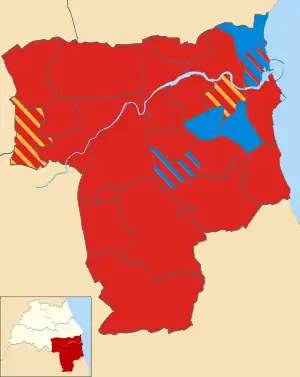 2004 results map
2004 results map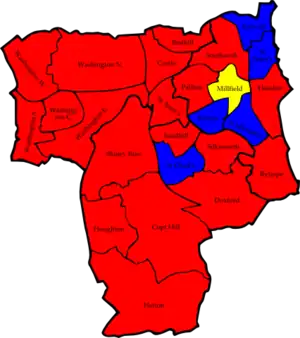 2006 results map
2006 results map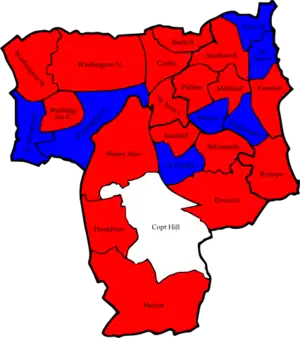 2007 results map
2007 results map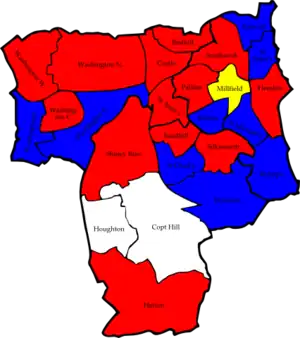 2008 results map
2008 results map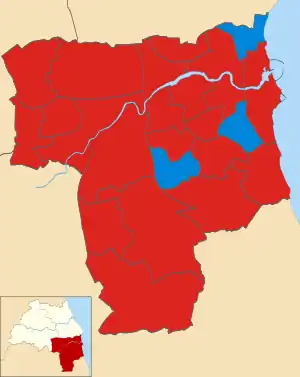 2010 results map
2010 results map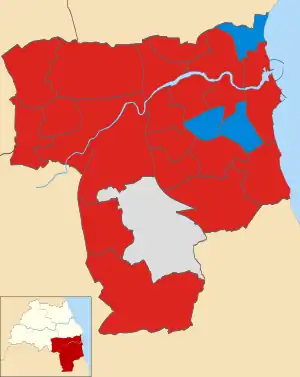 2011 results map
2011 results map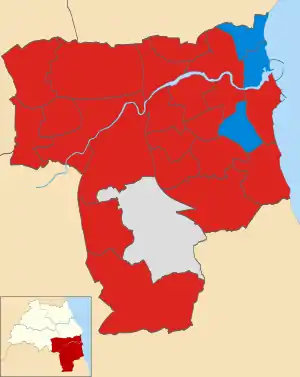 2014 results map
2014 results map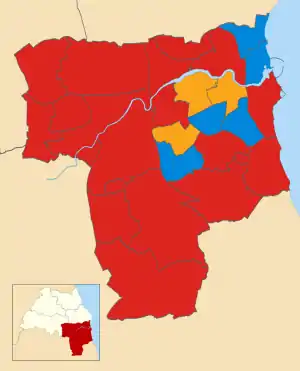 2018 results map
2018 results map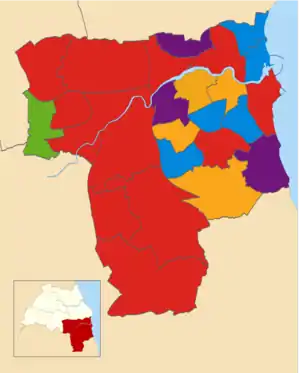 2019 results map
2019 results map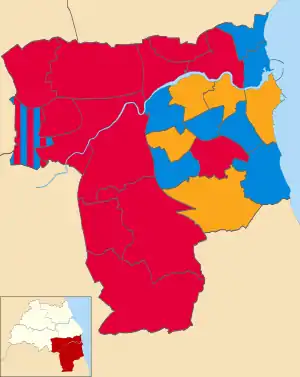 2021 results map
2021 results map
By-election results
1997-2004
| Party | Candidate | Votes | % | ±% | |
|---|---|---|---|---|---|
| Labour | 636 | 71.1 | -10.3 | ||
| Conservative | 178 | 19.9 | +1.3 | ||
| Liberal Democrats | 80 | 9.0 | +9.0 | ||
| Majority | 458 | 51.2 | |||
| Turnout | 894 | 11.4 | |||
| Labour hold | Swing | ||||
| Party | Candidate | Votes | % | ±% | |
|---|---|---|---|---|---|
| Labour | 646 | 46.7 | -18.7 | ||
| Conservative | 394 | 28.5 | +9.9 | ||
| Liberal Democrats | 343 | 24.8 | +8.9 | ||
| Majority | 252 | 18.2 | |||
| Turnout | 1,383 | 18.0 | |||
| Labour hold | Swing | ||||
| Party | Candidate | Votes | % | ±% | |
|---|---|---|---|---|---|
| Labour | 509 | 63.4 | |||
| Conservative | 155 | 19.3 | |||
| Liberal Democrats | 139 | 17.3 | |||
| Majority | 354 | 44.1 | |||
| Turnout | 803 | 11.8 | |||
| Labour hold | Swing | ||||
| Party | Candidate | Votes | % | ±% | |
|---|---|---|---|---|---|
| Labour | 3,074 | 65.9 | +2.2 | ||
| Conservative | 860 | 18.4 | -17.8 | ||
| Liberal Democrats | 731 | 15.7 | +15.7 | ||
| Majority | 2,214 | 47.5 | |||
| Turnout | 4,665 | ||||
| Labour hold | Swing | ||||
2004-present
| Party | Candidate | Votes | % | ±% | |
|---|---|---|---|---|---|
| Conservative | Anthony Morrissey | 1,139 | 50.8 | ||
| Liberal Democrats | Peter Taylor | 547 | 24.4 | ||
| Labour | Ian Galbraith | 489 | 21.8 | ||
| BNP | Ian Leadbitter | 67 | 3.0 | ||
| Majority | 592 | 26.4 | |||
| Turnout | 2,242 | 25.5 | |||
| Conservative hold | Swing | ||||
| Party | Candidate | Votes | % | ±% | |
|---|---|---|---|---|---|
| Liberal Democrats | Paul Dixon | 566 | 43.5 | ||
| Labour | Shirley Waldron | 397 | 30.5 | ||
| Conservative | Leslie Dobson | 260 | 20.0 | ||
| BNP | James Davison | 79 | 6.0 | ||
| Majority | 169 | 13.0 | |||
| Turnout | 1,302 | 18.2 | |||
| Liberal Democrats hold | Swing | ||||
| Party | Candidate | Votes | % | ±% | |
|---|---|---|---|---|---|
| Conservative | Angela Cuthbert | 1,196 | 49.9 | ||
| Labour | Dianne Snowdon | 994 | 41.5 | ||
| Liberal Democrats | David Snowball | 206 | 8.6 | ||
| Majority | 202 | 8.4 | |||
| Turnout | 2,396 | 27.6 | |||
| Conservative gain from Labour | Swing | ||||
| Party | Candidate | Votes | % | ±% | |
|---|---|---|---|---|---|
| Labour | Gemma Taylor | 1,418 | 47.1 | ||
| Independent | John Ellis | 1,124 | 37.3 | ||
| UKIP | Edward Coleman-Hughes | 302 | 10 | ||
| Conservative | George Brown | 111 | 3.7 | ||
| Liberal Democrats | Sue Sterling | 55 | 1.8 | ||
| Majority | 294 | 9.8 | |||
| Turnout | 3,010 | 33.3 | |||
| Labour hold | Swing | ||||
| Party | Candidate | Votes | % | ±% | |
|---|---|---|---|---|---|
| Labour | Jacqui Gallagher | 945 | 48.1 | ||
| UKIP | Aileen Casey | 555 | 28.2 | ||
| Conservative | Tony Morrissey | 345 | 17.6 | ||
| Green | Emily Blyth | 120 | 6.1 | ||
| Majority | 390 | 19.8 | |||
| Turnout | 1,965 | 23.2 | |||
| Labour hold | Swing | ||||
| Party | Candidate | Votes | % | ±% | |
|---|---|---|---|---|---|
| Labour | Tony Taylor | 775 | 38.3 | ||
| Conservative | Hilary Johnson | 595 | 29.4 | ||
| UKIP | Alistair Baxter | 506 | 25 | ||
| Green | Tony Murphy | 93 | 4.6 | ||
| Liberal Democrats | Stephen O'Brien | 52 | 2.6 | ||
| Majority | 180 | 8.9 | |||
| Turnout | 2,021 | 23.4 | |||
| Labour hold | Swing | ||||
| Party | Candidate | Votes | % | ±% | |
|---|---|---|---|---|---|
| Liberal Democrats | Stephen O'Brien | 824 | 45.0 | ||
| Labour | Gary Waller | 458 | 25.0 | ||
| UKIP | Bryan Foster | 343 | 18.7 | ||
| Conservative | Gavin Wilson | 184 | 10.0 | ||
| Green | Helmut Izaks | 23 | 1.3 | ||
| Majority | 366 | 20.0 | |||
| Turnout | 1,832 | 23.8 | |||
| Liberal Democrats gain from Labour | Swing | ||||
| Party | Candidate | Votes | % | ±% | |
|---|---|---|---|---|---|
| Liberal Democrats | Martin Haswell | 1,251 | 53.8 | ||
| Labour | Gordon Chalk | 807 | 31.7 | ||
| Conservative | Grant Shearer | 126 | 5.4 | ||
| UKIP | Steven Bewick | 97 | 4.2 | ||
| Green | Craig Hardy | 39 | 1.7 | ||
| Majority | 444 | 19.1 | |||
| Turnout | 2,324 | 31.7 | |||
| Liberal Democrats gain from Labour | Swing | ||||
| Party | Candidate | Votes | % | ±% | |
|---|---|---|---|---|---|
| Labour | Iain Scott | 661 | 31.6 | ||
| Liberal Democrats | John Lennox | 634 | 30.3 | ||
| Independent | David Geddis | 386 | 18.5 | ||
| Conservative | Adelle Burnicle | 303 | 14.5 | ||
| Independent | Maurice Allen | 67 | 3.2 | ||
| Green | Justine Merton-Scott | 41 | 2 | ||
| Majority | 27 | 1.3 | |||
| Turnout | 2,092 | 22.5 | |||
| Labour hold | Swing | ||||
| Party | Candidate | Votes | % | ±% | |
|---|---|---|---|---|---|
| Labour | John Usher | 709 | 46.9 | ||
| Liberal Democrats | Steven Donkin | 386 | 25.5 | ||
| Conservative | Sue Leishman | 296 | 19.6 | ||
| UKIP | Ian Lines | 85 | 5.6 | ||
| Green | Helmut Izaks | 35 | 2.3 | ||
| Majority | 323 | 21.4 | |||
| Turnout | 1,511 | ||||
| Labour gain from UKIP | Swing | ||||
At the time of resignation, incumbent Keith Jenkins was an independent.[14]
References
- "Information available about your Local Area". Sunderland City Council. Retrieved 21 December 2010.
- "Sunderland Municipal Borough / County Borough". A Vision of Britain through Time. GB Historical GIS / University of Portsmouth. Retrieved 14 August 2022.
- "Compositions calculator". The Elections Centre. Retrieved 10 August 2022.
- "Sunderland". BBC News Online. 19 April 2009. Retrieved 21 December 2010.
- "Council minutes". Sunderland City Council. Retrieved 14 August 2022.
- "Tributes to former Sunderland council leader and education chief". Sunderland Echo. 8 January 2019. Retrieved 14 August 2022.
- Incorporating local by-election results from 2000.
- Liberal prior to 1981, SDP-Liberal Alliance from 1981 to 1988.
- "Tyne and Wear: Ward Voting Summaries 1973-2015". Tyne and Wear Elects. Retrieved 19 February 2018.
- "Sunderland council". BBC News Online. Retrieved 21 December 2010.
- "Lib-Dems retain second seat in city". Sunderland Echo. 24 March 2006. Retrieved 21 December 2010.
- "Declaration of Result of Poll". Sunderland City Council. Archived from the original on 7 August 2011. Retrieved 21 December 2010.
- "Local Elections Archive Project — Redhill Ward". www.andrewteale.me.uk. Retrieved 17 April 2022.
- Clark, Kevin (19 January 2022). "By-election looms after resignation of former UKIP city councillor Keith Jenkins". Sunderland Echo. Retrieved 17 April 2022.
